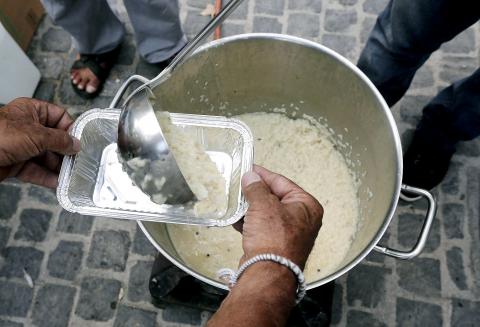Greece is close to a deal with its international creditors over thousands of job cuts aimed at clearing the way for the debt-laden nation to receive the next tranche of bailout funds worth 8.1 billion euros (US$10.4 billion), officials said.
“Very important progress was made,” a Greek Ministry of Finance official said late on Saturday after several hours of talks with representatives from the “troika” of lenders: the EU, the European Central Bank and the IMF, the state-run Athens News Agency reported.
Another official from the Greek Ministry of Administrative Reform told reporters: “We are in agreement, no new meeting is required” on a thorny dispute involving thousands of civil service layoffs.

Photo: Reuters
Greece needs to come to an agreement on the next package of reforms with the troika before today, when the Eurogroup meets to decide if the bloc should release the next instalment of rescue funds worth 6.3 billion euros.
The IMF is also scheduled to decide by the end of this month whether to disburse its scheduled contribution of 1.8 billion euros to the bailout kitty.
The funds are necessary as Greece must redeem three-month and six-month debt worth 6.6 billion euros by the middle of next month.
Among the reforms being negotiated are 4,000 state jobs, which would have to go by the end of the year. Greece must also redeploy 25,000 civil servants across its vast bureaucracy. These include hundreds of teachers, whom Athens has proposed to move to other state services.
Another 3,500 municipal police are to be incorporated in the national forces, a proposed move that has sparked strong opposition from local administration staff.
The latest cuts will be enshrined in a new multi-purpose law that will be tabled in Greece’s parliament today.
Since 2010, the EU and IMF have committed a total of 240 billion euros to the heavily indebted country.
In exchange for the funds, Greece has agreed to a series of reforms, including a commitment to raise revenues by offloading state assets.
However, Athens has been forced to once again scale back the expected revenues from its privatization drive for this year to 1.6 billion euros from the 2.6 billion euros forecast earlier.
The missing billion is to be rolled over to next year, a Greek official told the Athens News Agency.
Athens last month failed to sell DEPA, Greece’s public gas distributor, after Russian giant Gazprom JSC pulled out of the bidding process.
Greece has pledged to raise 9.5 billion euros in asset sales by 2016, slightly less than one-fifth of the original target of 50 billion euros.

Nvidia Corp chief executive officer Jensen Huang (黃仁勳) on Monday introduced the company’s latest supercomputer platform, featuring six new chips made by Taiwan Semiconductor Manufacturing Co (TSMC, 台積電), saying that it is now “in full production.” “If Vera Rubin is going to be in time for this year, it must be in production by now, and so, today I can tell you that Vera Rubin is in full production,” Huang said during his keynote speech at CES in Las Vegas. The rollout of six concurrent chips for Vera Rubin — the company’s next-generation artificial intelligence (AI) computing platform — marks a strategic

REVENUE PERFORMANCE: Cloud and network products, and electronic components saw strong increases, while smart consumer electronics and computing products fell Hon Hai Precision Industry Co (鴻海精密) yesterday posted 26.51 percent quarterly growth in revenue for last quarter to NT$2.6 trillion (US$82.44 billion), the strongest on record for the period and above expectations, but the company forecast a slight revenue dip this quarter due to seasonal factors. On an annual basis, revenue last quarter grew 22.07 percent, the company said. Analysts on average estimated about NT$2.4 trillion increase. Hon Hai, which assembles servers for Nvidia Corp and iPhones for Apple Inc, is expanding its capacity in the US, adding artificial intelligence (AI) server production in Wisconsin and Texas, where it operates established campuses. This

Garment maker Makalot Industrial Co (聚陽) yesterday reported lower-than-expected fourth-quarter revenue of NT$7.93 billion (US$251.44 million), down 9.48 percent from NT$8.76 billion a year earlier. On a quarterly basis, revenue fell 10.83 percent from NT$8.89 billion, company data showed. The figure was also lower than market expectations of NT$8.05 billion, according to data compiled by Yuanta Securities Investment and Consulting Co (元大投顧), which had projected NT$8.22 billion. Makalot’s revenue this quarter would likely increase by a mid-teens percentage as the industry is entering its high season, Yuanta said. Overall, Makalot’s revenue last year totaled NT$34.43 billion, down 3.08 percent from its record NT$35.52

PRECEDENTED TIMES: In news that surely does not shock, AI and tech exports drove a banner for exports last year as Taiwan’s economic growth experienced a flood tide Taiwan’s exports delivered a blockbuster finish to last year with last month’s shipments rising at the second-highest pace on record as demand for artificial intelligence (AI) hardware and advanced computing remained strong, the Ministry of Finance said yesterday. Exports surged 43.4 percent from a year earlier to US$62.48 billion last month, extending growth to 26 consecutive months. Imports climbed 14.9 percent to US$43.04 billion, the second-highest monthly level historically, resulting in a trade surplus of US$19.43 billion — more than double that of the year before. Department of Statistics Director-General Beatrice Tsai (蔡美娜) described the performance as “surprisingly outstanding,” forecasting export growth